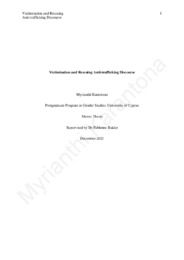Victimisation and rescuing anti-trafficking discourse

View/
Date
2021-12Author
Karantona, MyrianthiPublisher
Πανεπιστήμιο Κύπρου, Σχολή Κοινωνικών Επιστημών και Επιστημών Αγωγής / University of Cyprus, Faculty of Social Sciences and EducationPlace of publication
CyprusGoogle Scholar check
Keyword(s):
Metadata
Show full item recordAbstract
This thesis explores the discourse and policies of Republic of Cyprus regarding trafficking, as well the discourses in the Cyprus press. By using an intersectional approach, the analysis focus on how human trafficking is defined through media and policies and what is the impact of the way human trafficking is presented, on trafficking victims. My content and discourse analysis shows how anti-trafficking policies, media and anti-trafficking campaigns don’t take into consideration the different aspects of people’s identities that place them in a disadvantage position. Media describe trafficking through framing, such as ‘war frame’, ‘victimisation frame’ and ‘rescuing frame’, suggesting that human trafficking is an organised crime, where the vulnerable victims need to be saved by the governments. Through this discourse the image of ideal victims; the image of a women trafficked for the purpose of sexual exploitation; is promoted, excluding other images of victims. This image of vulnerable women is sometimes supported from NGOs, who are presented as the representatives of the victims, as they are more ‘experts’ to tell their stories.
Collections
Cite as
The following license files are associated with this item:

